Marketers are constantly wondering when the best time to launch a campaign is, for example, you may have found yourself asking “when is the best day to send SMS campaigns?”. Getting the timing right is critical to success for any marketing activity, but especially so with SMS campaigns due to how quickly recipients typically open text messages.
We’ve discovered some common patterns and trends in our message data which we’ll explore to help you in the planning and scheduling of your future campaigns.
When is the best day to send SMS messages?
At Text Marketer, we have analysed millions of SMS messages sent by our clients from January 2022 to June 2023. Our objective was to discover which days proved most popular within each industry when it comes to sending SMS messages.
Overall, it appears that the most popular day of the week to send a marketing campaign is Wednesday. Our customers, regardless of industry and use case, have sent more messages on that day of the week than any other. The reasons for this vary per sector – keep reading to discover more.
We’ve broken our data down by our eight largest sectors:
- Healthcare
- Retail
- Financial services
- Insurance
- Transport
- Utilities
- Recruitment
- Entertainment
So, let’s take a look at what the data has to say about each!
Tuesday is most popular for healthcare
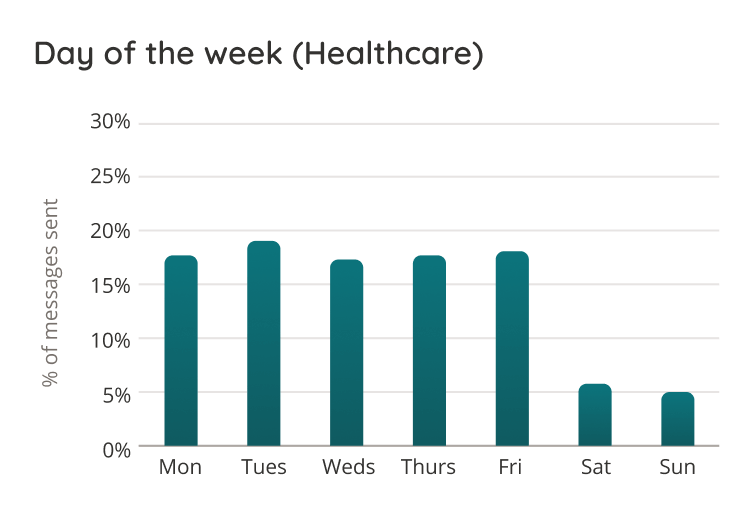
The healthcare industry is a highly active sector which sent millions of SMS messages during this period. Whilst Tuesday does appear to be the most popular day to send, making up 19% of all messages sent, there are some other noticeable trends within the data.
A clear theme, and one we’ll come across several times through this blog, is that weekdays are significantly busier than the weekend. In fact, between Saturday and Sunday, only 11% of SMS messages were sent in the healthcare sector.
Aside from this, weekdays take a relatively similar proportion of the remaining messages. The fewest messages were sent on Wednesday, with 17% sent throughout the week, compared to the most popular, Tuesday, at 19%.
A key reason why the messages appear to be consistent across the weekdays is due to the use cases for SMS across the sector.
A key reason why SMS messages are more likely to be sent on a weekday than a weekend may be due to why the healthcare sector uses mobile messaging. For example, pharmacies use this platform to notify patients of prescription deliveries. Due to the nature of these messages, they’re typically sent throughout the week at regular intervals. This is especially noticeable when compared to other industries who use the platform for more traditional promotional-style messages.
Retail’s favourite day is Monday
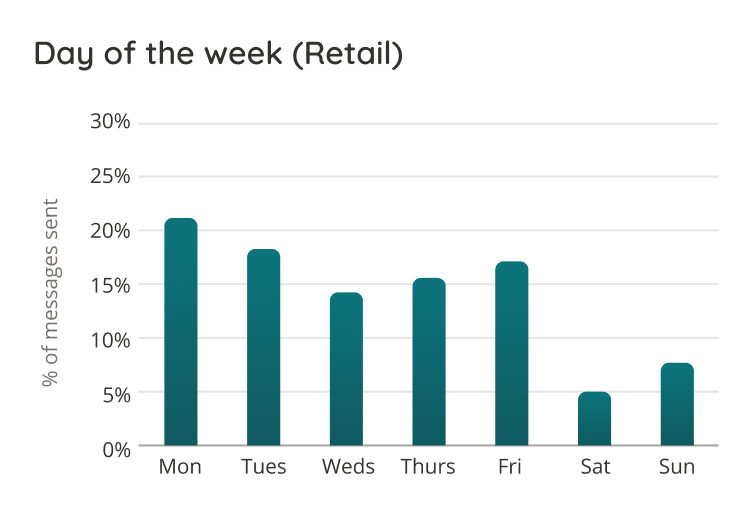
Monday and Tuesday are strong days for retail, taking nearly 40% of all messages, with Monday sitting at 21% and Tuesday at 19%.
After this, there’s a clear drop off mid-week. However, Wednesday is the least popular weekday, taking only 14% of the share of messages sent. Afterwards, there is a slight rally heading through Thursday and Friday, creating an U-shaped trend across the weekdays.
A key reason why SMS messages are more likely to be sent on a weekday than a weekend may be due to why the healthcare sector uses mobile messaging. For example, pharmacies use this platform to notify patients of prescription deliveries. Due to the nature of these messages, they’re typically sent throughout the week at regular intervals. This is especially noticeable when compared to other industries who use the platform for more traditional promotional-style messages.
What does the weekend look like?
This may come as a surprise as you may expect more retail trade to be done at the weekend compared to the rest of the week. However, it’s for this exact reason that we see the trend displayed.
Retailers tend to favour promotional messaging, such as promo code alerts and flash sales notifications. As consumers naturally gravitate to the weekend to browse and purchase goods, there’s less need for aggressive marketing. Whereas consumers are less likely to shop at the beginning of the week, meaning it requires more effort to change that behaviour.
It’s Monday again for financial services
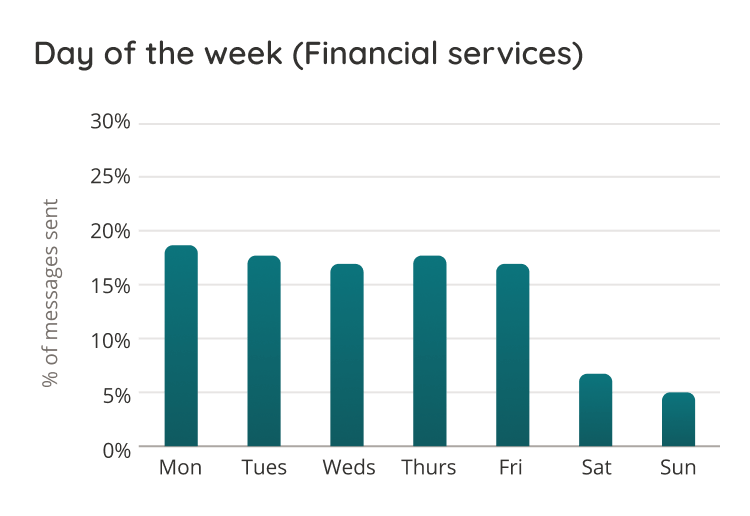
For the financial services industry, Monday is also the most popular day to send SMS messages. In fact, we see a relatively similar pattern to the retail sector, though less pronounced, with a stronger start to the week followed by a midweek drop and a small uptick before dropping off at the weekend.
By far the most common use of SMS in financial services is security and authentication purposes. Think along the lines of receiving a single-use code via text when you log into your banking app, or if you perform a digital transfer.
As customers make use of these services consistently throughout the working week, both professionally and personally, there’s a consistent trend from Monday to Friday. Unsurprisingly, this culminates with a weekend drop; Sunday is the least popular day of the week.
Friday is a blowout for insurance
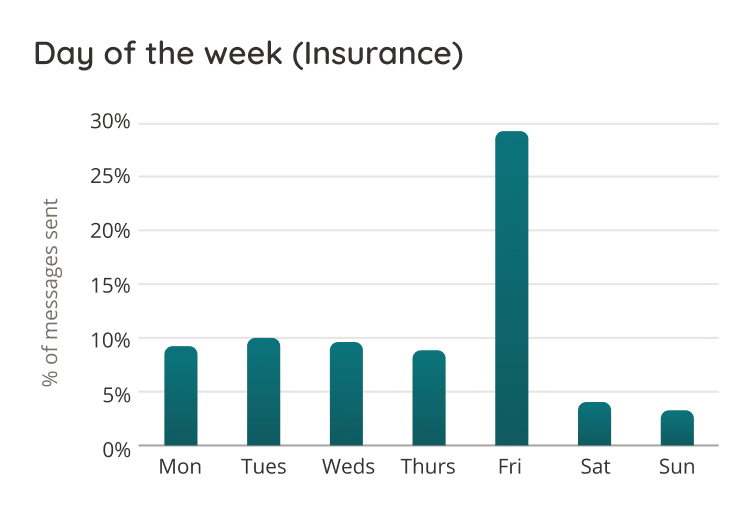
A key differentiation found between the insurance industry and the rest of the financial services sector is that Friday dominates in comparison to the rest of the week, taking up a 39% share of all messages sent by the insurance sector.
Let’s use insurance clients specialising in temporary vehicle cover, such as van or car rentals, as an example. Their end customers usually require these services at the end of the week -such as renting a van for the weekend in order to move house, then purchase vehicle insurance.
The insurance provider would then use SMS to send notifications to customers, such as a confirmation of their recent insurance purchase. Hence why message sending spikes on Fridays for the insurance sector.
Thursday is the day for transport
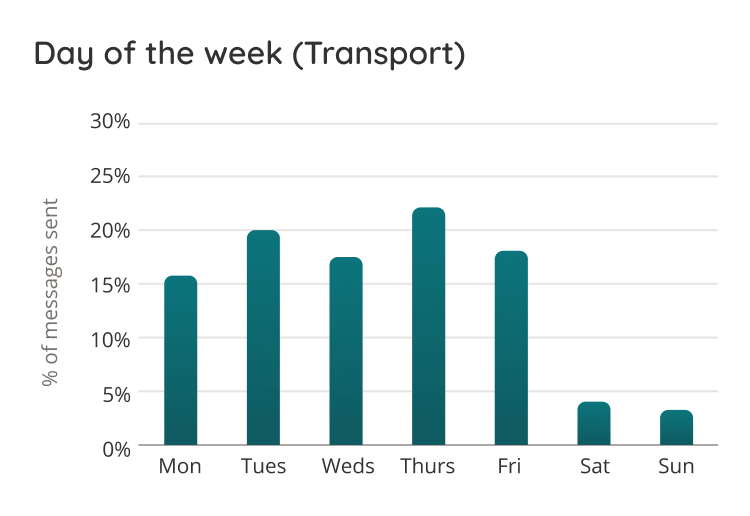
Overall, Thursday is the most popular, but Tuesday is not far behind. This is likely because some of the highest senders operate in the private parking niche of the transport sector.
That may explain why message sends spike during the week – it’s when people tend to travel into the office. However, as the work-from-home trend continues to become ever more established, we may see the data change over time as a result of people choosing to not go into the office on specific days.
SMS is also commonly used in the transport sector as an internal shift management platform, helping companies communicate with employees about working times and shift changes. This may further contribute to the lack of consistency as these vary from business to business.
Monday and Tuesday share the crown for utilities
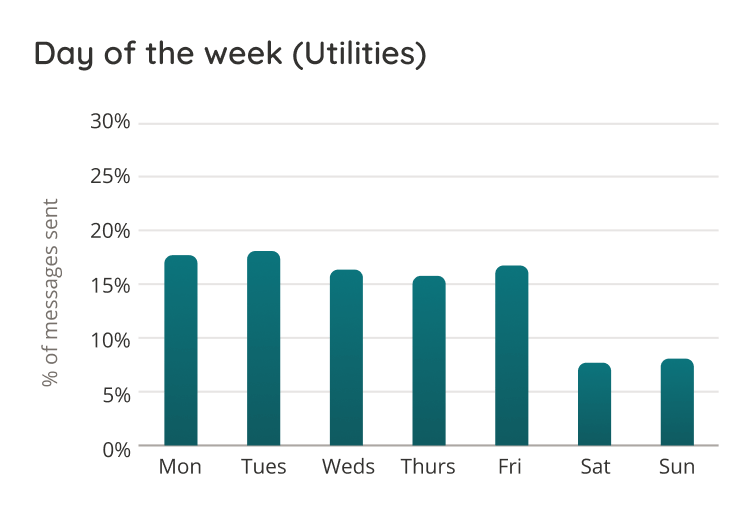
Whilst Monday and Tuesday both see 18% of the messages sent within the utilities sector, it’s a very stable pattern throughout the working week with the lowest weekday – Thursday – still taking a 16% share.
With water and energy providers, in particular, the main use cases tend to vary between either one-way alerts, such as notifications of electricity usage compared to a customer’s tariff, or two-way conversations used to triage customer service issues.
For example, before speaking to a customer service representative on the phone, a customer may be asked to reply to a text message with a number of options, asking which best describes their issue. This information is then passed on to the employee handling the call to provide additional context to the conversation.
Unsurprisingly, we again see a drop off at the weekend as customers tend to prefer to interact with utilities suppliers during the working week. However, out of our eight core industries, we do see one of the highest share of messages sent at the weekend for the utility sector, likely stemming from a consumer expectation that they should be able to reach their electricity or water supplier at any time they need.
Recruitment favours Tuesdays
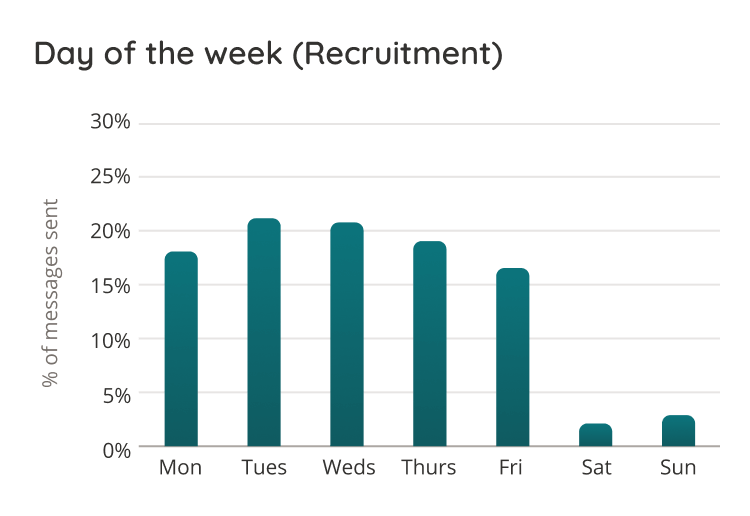
We see an interesting trend for the recruitment sector as there’s a small uptick at the start of the week followed by a distinct downward slope heading towards the weekend.
The most popular use case in the recruitment sector comes from temporary staffing coverage, where SMS is used to inform applicants of shifts available to them, and to gauge interest. In these scenarios, two-way conversational messages are used by the recruiter to send out the details of a job, which the applicant may then reply with “YES” or “NO”.
These types of messages make up a large portion of the volume we see in the recruitment industry and is almost certainly why we see such strong performance on work days in comparison to the weekend.
Tuesday is entertainment’s most popular day
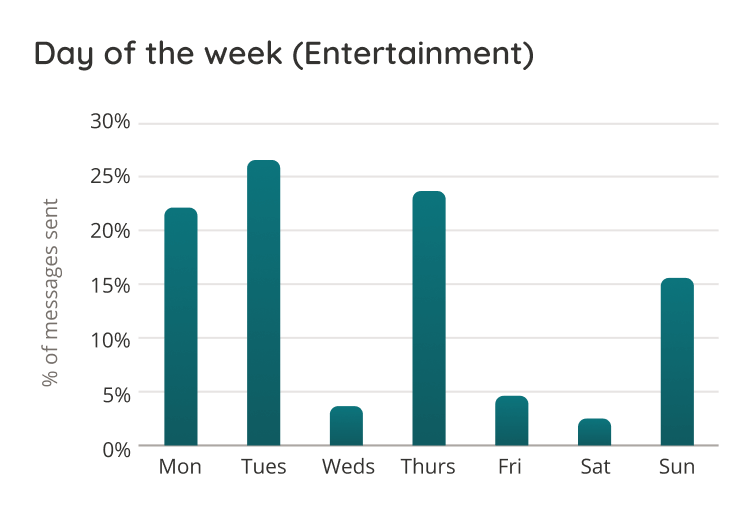
The entertainment industry is another example of a highly diverse sector serviced by SMS marketing. It’s also dominated by more promotional-style campaigns, much like the retail sector. However, the data suggests that when it comes to SMS marketing, the entertainment industry tends to have an “all-or-nothing” approach, with very specific days taking huge portions of the sent messages, whilst other days have almost no activity at all.
Tuesday is the most popular, taking up 27% of all messages sent in the entertainment industry, followed closely by Monday and Thursday, which take 24% and 22% respectively. Across those three days, they make up nearly three quarters of all messages sent in the industry.
Conversely, if you combine the volume of messages sent on Wednesday, Friday and Saturday, it barely scratches 12% in total. Interestingly, Sunday, with 16% of all sends, has by far the highest share of messages sent on the weekend out of all the industries we’ve looked at. This is most likely an attempt to get consumers to spend more time engaged before the start of a new work week when it’s more likely that they’ll spend much less time and money on entertainment compared to the weekend.
SMS provides flexibility unlike any other channel
Whilst we hope that this deep dive into our data has provided you with some insight into how you can better time your SMS activities, we also hope it’s helped highlight the range of ways SMS can be utilised across business functions, both internally and externally. If you’re already using SMS as part of your marketing strategy, have you considered how you might be able to expand on your existing usage?
Or maybe you’re wondering how two-way conversations could improve your customer service. Whatever your situation, SMS messages can be adapted for an extremely wide range of scenarios and use cases.
Build out your next campaign by logging into our platform, or, if you’re at the start of your SMS journey, sign up for our free trial by clicking the button below to start sending!

